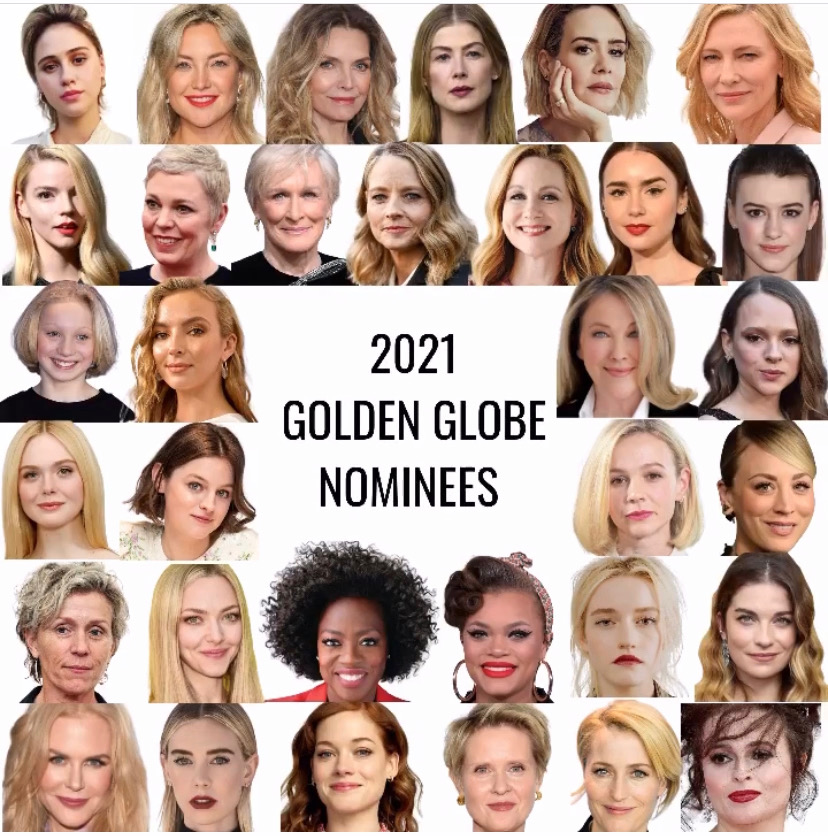The Golden Globe nominations lack diversity and disappoint communities everywhere
Photo courtesy of @nicolasschulze on Instagram
A graphic displaying the 2021 Golden Globe nominees for best actresses. Out of the 20 slots, the only two women of color nominated are Viola Davis and Andra Day.
February 25, 2021
And once again, the winner is… white, neurotypical and straight. With the release of the 2021 Golden Globe Awards nominations, entertainment fans were left frustrated by the overwhelmingly white nominees and disappointed by multiple snubs.
A large shortcoming of this year’s Golden Globe nominations was the overall lack of racial diversity, with an upsetting amount of nominees being white. This left many going to social media to criticize the nominations for “rewarding white mediocrity” as @athenakugblenu on Twitter put it. An apparent example of this were the two nominations for “Emily in Paris” for best television series – musical or comedy and best performance by an actress in a television series – musical or comedy for Lily Collins.
“Emily in Paris,” a terribly cheesy Netflix show about a white American woman traveling to Paris for work without knowing anything about the language or culture received two nominations while Michaela Coel’s drama series “I May Destroy You,” received none.
Fans of “I May Destroy You” were shocked and disappointed by the lack of recognition for the show. With a predominantly Black British cast and touching on topics of sexual assault and mental health, “I May Destroy You” is a very vulnerable and ground-breaking show, especially considering the story is based off of Michaela Coel’s own experiences with sexual assault.
While “Emily in Paris” was an entertaining binge, the acting and writing were not worthy of awards praise and its nomination is a complete disrespect to Michaela Coel and other BIPOC (Black, Indigenous and people of color) that were snubbed. Twitter user @museummammy said it best with their tweet that received 160,000 likes, “if you don’t think white supremacy is real, Emily in Paris is nominated for a golden globe.”
There were multiple other snubs of Black stories in television and film including Issa Rae’s show “Insecure,” Uzo Aduba for her role in “Mrs. America,” Lamorne Morris for “Woke,” Shonda Rhimes’s show “Bridgerton” and Spike Lee’s movie “Da 5 Bloods.”
On top of this, out of the 20 slots for female performers there were only 2 women of color nominated: Viola Davis for “Ma Rainey’s Black Bottom” and Andra Day for “The United States Vs. Billie Holiday.”
In addition to this, James Corden, a straight man, was nominated for best performance by an actor in a motion picture – musical or comedy for his role of Barry Glickman, a gay character, in “The Prom.” For a long time, members of the LGBTQ+ community have been calling for more representation in the entertainment industry, with actual members of the community portraying characters with the same sexualities instead of casting straight people to play these roles.
Straight actors have been receiving nominations and awards for playing LGBTQ+ characters for many years, while actual members of the community are less likely to get cast or receive any recognition for playing roles that they have real connections to. Eddie Redmayne received an Oscar for playing a transgender woman in “The Danish Girl,” Hilary Swank received an Oscar for playing a transgender man in “Boys Don’t Cry, ” and more recently, Timothee Chalamet received massive praise for portraying a gay man in “Call Me By Your Name,” but viewers very rarely get to see accurate representation due to this casting. All of these actors, Corden included, benefitted from playing LGBTQ+ roles while not actually living through any of the struggles.
Another upsetting nomination was that of “Music,” a movie written and directed by singer Sia, that is about a young woman on the autism spectrum named Music (Maddie Ziegler) who is put under the guardianship of her half-sister Zu (Kate Hudson), which was nominated for best motion picture – musical or comedy. Kate Hudson was nominated for best performance by an actress in a motion picture – musical or comedy for her role.
The autism community has widely regarded this film as ableist and insensitive, especially due to the fact that Maddie Ziegler, a neurotypical (non-autistic) actress, portrayed a young woman on the autism spectrum. Members of the disabled community have said it upholds harmful stereotypes, promotes restraining autistic people (which members of the community say is traumatizing and can be lethal) and does not even offer accurate representation to the disabled community.
“The movie was filtered through the eyes of someone who was not in the community,” Maria Davis-Pierre, a licensed mental health counselor and the CEO and founder of Autism in Black Inc., told USA TODAY. “And that’s one of the biggest issues is when stories are filtered through the eyes of someone who doesn’t understand.”
This year’s Golden Globes snubs and disappointments prove that diversity in awards recognition still has far to go, and that the BIPOC stories that largely receive recognition are those that center white saviors or cater to a white audience. Furthermore, the entertainment industry only praises “empowering” stories when the audience who actually gets empowered are neurotypical, straight, white people, which is illustrated by the nominations of “Music,” James Corden and “Emily in Paris.”
While there were strides this year in the director category, with 3 out of the 5 nominees being women, this is simply not enough to make up for the complete disregard and disrespect of multiple marginalized communities. The entertainment industry must start casting and hiring behind the scenes people who are actually members of the communities they are trying to portray instead of rewarding actors and writers who will never truly understand the roles that they are able to stop playing at the end of the day.


